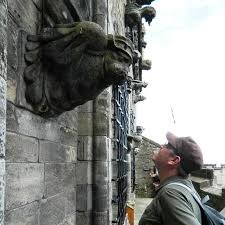Blake Couey

Blake Couey is a professor in the department of religion here at Gustavus. Here's what Blake has to say about his current research:
If someone had asked me a few years ago how my research as a biblical scholar connects with climate change, I would have struggled to come up with an answer. My work involves parsing Hebrew verbs and comparing ancient manuscripts, not measuring carbon emissions or calculating rising sea levels! The turning point came the first time I heard a climate change denier quote the Bible as evidence that humans can’t permanently impact the climate: “As long as the earth endures, seedtime and harvest, cold and heat, summer and winter, day and night, shall not cease” (Genesis 8:22 NRSV). Ironically, this text comes from the story of Noah’s flood--a story about how human violence and corruption caused a global ecological catastrophe! If those of us with specialized training in biblical interpretation don’t want crude misinterpretations like this to go unchallenged, then we have to pay attention to how the Bible intersects with the topic of climate change.
Much of the Bible was written in an agricultural society that only marginally operated above subsistence level. Although its writers might not have been able to imagine the scope of our current environmental crisis, they were all too aware of the fragility of the earth and the possibility that humans could damage it. Approaching the text with an awareness of climate change helps readers recognize important dynamics that they might miss otherwise. For instance, several key biblical characters were climate refugees, like Abraham and Sarah (Genesis 13), Jacob and his family (Genesis 42), or Elimelech and Naomi (Ruth 1). Warnings of environmental devastation and military invasion frequently appear side-by-side in prophetic judgment speeches like Isaiah 19 or Jeremiah 4. This has puzzled many biblical scholars, and some even argue that the verses about environmental devastation must have been added later. Although that may be historically correct, writing off these concerns as “secondary” misses the text’s profound insight that militarism and degradation of the natural world are inseparably linked. These are some of the connections that I’m hoping to highlight as I write a commentary on Isaiah chapters 1-39.
When read from the perspective of contemporary ecological concerns, the threats uttered by the ancient biblical prophets sound ominously urgent: “Who is wise enough to understand this? … Why is the land ruined and laid waste like a wilderness, so that no one passes through? And the LORD says: Because they have forsaken my law that I set before them, and have not obeyed my voice” (Jeremiah 9:12-13). The study of art, literature, philosophy, and religion offers rich resources for articulating what’s at stake for the earth and all of its living inhabitants in our current moment. The texts left by ancient Judean sages and seers are no exception.